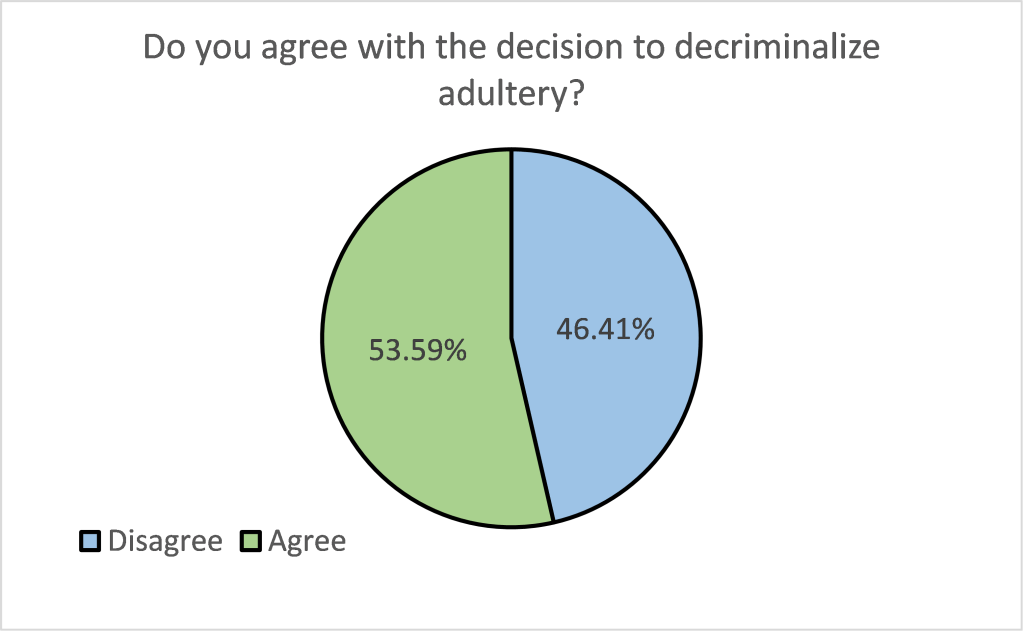Written by Madelynn Einhorn, Josie Coyle, and Timothy S. Rich.
Image credit: Interior in Constitutional Court, Judicial Yuan by Jiang/ Wikimedia Commons, license: CC BY-SA 3.0.
In June 2021, the Taiwanese legislature removed a nearly 90-year law criminalizing adultery, punishable with up to 12-months in prison and fines averaging 90,000 NTD (roughly USD 3000). In May 2020, the Constitutional Court overruled Article 239 of Taiwan’s criminal code, which criminalized adultery, because it violated the Constitution. The legislature removed the article from the legal code approximately a year later. South Korea removed a similar law in 2015 and India in 2018. Taiwan was one of the last liberal democracies to keep adultery illegal and the last East Asian country aside from the Philippines.
Article 239 was regarded as quite controversial – supporters believed it upheld the sanctity of marriage, while others argued the law disproportionately targeted women and removed their sexual autonomy. From 2016 to 2019, over 1,000 people were convicted under Taiwan’s law, with many receiving fines and some prison time. Women composed 54% of convictions, despite making up less than 20% of Taiwan’s overall criminal convictions. This is believed to be because men are more likely to press charges against their wives, while women tend to press charges against the third party, their husband’s mistress.
Criminalizing adultery also incentivized other behaviours. To ensure an adultery conviction, many spouses sought ways to film their partner engaged in intercourse with someone else, often violating one’s right to privacy and leading to bribes between partners and private investigators. Others would use adultery charges to ensure they get additional child support and custody of children. One widowed woman faced nearly 300 years in prison for engaging in an affair with a married man, four months for each extra-marital affair.
Past public opinion survey results have largely supported maintaining criminal punishment for adultery. For example, in 2013, over 80% of Taiwanese supported Article 239. Similarly, in 2015, nearly 90% of Taiwanese viewed Article 239. Public opinion polls in 2020 also found most respondents disagreed with decriminalising adultery laws. Yet, relatively little public opinion data has addressed how Taiwanese feel after the Constitutional Court declared that Article 239 violated the constitution’s spirit and formally removed criminalization in 2021. For example, despite Taiwan Social Change Surveys in 2010 and 2015 finding majority support for same-sex marriage, organized opposition to same-sex marriage increased following a Constitutional Court decision declaring the existing Civil Code as unconstitutional, leading to the passage of several anti-LGBT referenda in 2018. After the Legislative Yuan ultimately passed legislation to allow same-sex marriages in 2019, not only did partisan divisions on support endure, but 54.64% of those who said they had changed their mind on same-sex marriage since legalization said they now opposed it compared to only 27.84% supportive. However, we have not seen organized opposition to removing Article 239 to the extent seen against same-sex marriage. This may be for a multitude of reasons, including perhaps deference to the Constitutional Court’s decision to pay attention to more pressing concerns such as the COVID-19 pandemic.
To address views on decriminalizing adultery, we surveyed 640 Taiwanese respondents from May 18th-20th via a web survey administered by PollcracyLab at National Chengchi University’s (NCCU) Election Study Centre.
We asked respondents the following question: ‘In June 2021, the Taiwanese legislature amended Article 239 of the Criminal Code to remove the following statute: “A married person who commits adultery with another shall be sentenced to imprisonment for not more than one year; the other party to the adultery shall be subject to the same punishment.” Do you agree with this decision?’
The chart below shows that 53.59% of respondents supported decriminalizing adultery, and 46.41% disagreed with the legislature’s decision. We find that views sharply differed between supporters of the two largest parties, with Democratic Progressive Party (DPP) supporters largely in favour of the decriminalization (67.32%) while Kuomintang (KMT) supporters largely disagreed with the change (61.21%). Broken down by gender, we find that most men supported decriminalization (55.81%), while women were evenly split on the issue. In addition, regression analysis incorporating demographic factors (gender, age, income, education) and party affiliation only found the party variables (DPP, KMT) to be statistically significant in the opposite directions. Interestingly, there was no statistically significant variation between female and male opinion, despite widespread criticism that women disproportionately are targeted by adultery laws.

That our findings diverge from polls prior to the Constitutional Court decision could be due to several factors unrelated to a broad change of heart in the populace. For example, we may be picking up an acquiescence bias, where people defer to an agreement or what is seen as the status quo. In addition, respondents may not have had strong feelings in our survey or previous surveys, with many willing to choose a third option (e.g., neither do not know) if available. But if taken at face value, our results suggest a public that may see criminalization as venturing too much into the private sphere.
What motivated this partisan divergence is also unclear. Admittedly, our survey did not have controls for political ideology (e.g., very liberal to very conservative) or for religious affiliation, both factors that would presumably influence support and overlap with party identification. Nor did we ask about marital status, which would influence views, especially if one had been in a relationship with an unfaithful partner. In contrast, respondents otherwise indifferent about the change may be responding implicitly to the fact that the change occurred under a DPP-led government and thus responding in part to the partisan context rather than the content of the change. This would be consistent with our findings in the survey of satisfaction with democracy and confidence in political institutions being higher among DPP supporters than KMT supporters.
It is too soon to identify the broader ramifications of decriminalization. Still, one may cautiously draw parallels to concern about how the legalization of same-sex marriage in 2019, also under a DPP-led government, would erode traditional marriage and become a focal point in the 2018 referenda and local elections. For example, those indifferent to decriminalization may be swayed to see this in the framework of a challenge to traditional values, especially if conservative parties see this as an opportunity for electoral gain in 2022.
Madelynn Einhorn is a recent alumna from Western Kentucky University, majoring in Political Science and Economics.
Josie Coyle is an honours undergraduate researcher at Western Kentucky University, with majors in International Affairs and Chinese.
Timothy S. Rich is a professor of political science at Western Kentucky University and director of the International Public Opinion Lab (IPOL). His research focuses on public opinion and electoral politics in East Asia.

